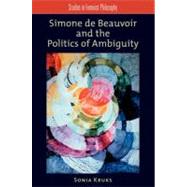Simone de Beauvoir and the Politics of Ambiguity
, by Kruks, Sonia- ISBN: 9780195381436 | 0195381432
- Cover: Paperback
- Copyright: 11/19/2012
Simone de Beauvoir and the Politics of Ambiguity is the first full-length study of Beauvoir's political thinking. Best known as the author of The Second Sex, Beauvoir also wrote an array of other political and philosophical texts that are less well known. Together, these constitute an original contribution to political theory and philosophy. The book both locates Beauvoir in her own intellectual and political context and demonstrates her continuing significance. For, in her unique voice, Beauvoir still speaks to a range of pressing theoretical and practical questions concerning politics. These include the political value and dangers of liberal of humanism; how oppressed groups become complicit in their own oppression; how social identities are perpetuated; the limits to rationalism and the place of emotions, such as the desire for revenge, in politics. In discussing Beauvoir's reflections on these and other matters the book puts her ideas into conversation with those of many contemporary thinkers, including feminist and race theorists, as well as with historical figures in the liberal, Hegelian, and Marxist traditions. Beauvoir's political thinking emerges from her fundamental insights into the ambiguity of human existence. Combining phenomenological descriptions with structural analyses, she focuses on the tensions of human action as both free and constrained. To be human is to be an embodied self, to be capable of free choice and yet to be constrained and physically vulnerable. It is also to be in the world with many other such selves, whose relationships may be both reciprocal and conflictual or oppressive. Such ambiguities are intrinsic to politics, and they are not subject to resolution. Beauvoir thus shows us that failure is a necessary part of political action, and she insists that we acknowledge this while also assuming responsibility for the outcomes of what we do.






